What Does That Dog Training Certification Mean?
Dog Training Certifications
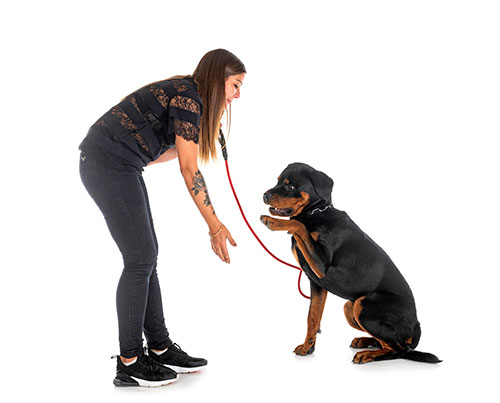 What do the credentials listed after a dog trainer’s name mean? Since there is no formal education or training necessary before an individual can offer dog training services, it’s important to understand what is required for dog trainers to attain some of the most widely recognized certifications. Keep in mind that although certifications are not the only measure of a trainer’s capability, it’s a reliable indicator that someone is committed to on-going education, as well as positive reinforcement techniques. It is harder to assess these important criteria with individuals who have not completed any formal training.
What do the credentials listed after a dog trainer’s name mean? Since there is no formal education or training necessary before an individual can offer dog training services, it’s important to understand what is required for dog trainers to attain some of the most widely recognized certifications. Keep in mind that although certifications are not the only measure of a trainer’s capability, it’s a reliable indicator that someone is committed to on-going education, as well as positive reinforcement techniques. It is harder to assess these important criteria with individuals who have not completed any formal training.
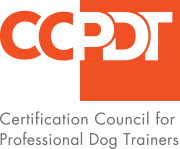
Certifications issued by the CCPDT (Certification Council for Professional Dog Trainers)—
CPDT-KA (Certified Professional Dog Trainer-Knowledge Assessed) This certification measures a broad range of knowledge and skills in ethology, learning theory, dog training technique, and instruction. Candidates must have at least 300 hours of experience in the last three years, confirm their compliance with LIMA (Least Invasive Minimally Aversive) and pass a 200-question exam.
CPDT-KSA (Certified Professional Dog Trainer—Knowledge and Skills Assessed) In addition to the CPDT- Knowledge Assessed certification, individuals pursuing the Knowledge and Skills Certification must submit video recordings of training sessions, which are evaluated by the CCPDT.
CBCC-KA (Certified Behavior Consultant Canine-Knowledge Assessed) Candidates must pass a standardized test that covers applied behavior analysis, consulting skills and best practices, ethology, body language, observational skills, health, development, life stages, anatomy, and physiology.
CBATI Certification
 CBATI-KA (Certified Behavior Adjustment Training Instructor Knowledge Assessed) program aims to provide trainers a solid foundation in the theory and spirit behind the BAT method and is the first step on the journey to becoming a Certified Behavior Adjustment Training Instructor – Knowledge and Skills Assessed (CBATI-KSA, formerly known as CBATI without the KSA part).
CBATI-KA (Certified Behavior Adjustment Training Instructor Knowledge Assessed) program aims to provide trainers a solid foundation in the theory and spirit behind the BAT method and is the first step on the journey to becoming a Certified Behavior Adjustment Training Instructor – Knowledge and Skills Assessed (CBATI-KSA, formerly known as CBATI without the KSA part).
 CBATI-KSA (Certified Behavior Adjustment Training Instructor Knowledge and Skills Assessed) The CBATI-KSA designation is the more advanced level in the CBATI family. CBATI-KSAs (formally known as CBATIs) have already demonstrated their knowledge of BAT by successful completion of the CBATI-KA program, and have additionally had their skills reviewed in a rigorous Practical Skills Assessment process.
CBATI-KSA (Certified Behavior Adjustment Training Instructor Knowledge and Skills Assessed) The CBATI-KSA designation is the more advanced level in the CBATI family. CBATI-KSAs (formally known as CBATIs) have already demonstrated their knowledge of BAT by successful completion of the CBATI-KA program, and have additionally had their skills reviewed in a rigorous Practical Skills Assessment process.
KPA-CTP (Karen Pryor Academy—Certified Training Partner)

This six-month program includes ten hours of weekly online instruction and four weekends of in-person training. Competencies that are assessed include technical knowledge, as well as hands-on training techniques performed in compliance with the organization’s ethical guidelines. IAABC (International Association of Animal Behavior Consultants) The IAABC offers internationally recognized credentials in dog, cat, equine, parrot and shelter behavior. This certification is centered around the practical application of behavior change principles following LIMA (Least Intrusive Minimally Aversive) strategies.
CDBC (Certified Dog Behavior Consultant)
Candidates for this certification are required to submit written case studies and responses to questions as well as demonstrate competency in six core areas, including assessment and intervention strategies, consulting skills, knowledge of animal behavior and relevant species-specific knowledge of healthcare, husbandry, nutrition, and behavior.
APDT (Association of Professional Dog Trainers)
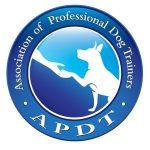 Members of APDT are full or part-time trainers and behavior consultants who work for income or as volunteers. These members teach group classes, do private consultations, and may work in a shelter, veterinary or other training setting such as service dog, animal assisted intervention, working dog, and sports dog training. APDT members adhere to LIMA (Least Intrusive Minimally Aversive) training techniques.
Members of APDT are full or part-time trainers and behavior consultants who work for income or as volunteers. These members teach group classes, do private consultations, and may work in a shelter, veterinary or other training setting such as service dog, animal assisted intervention, working dog, and sports dog training. APDT members adhere to LIMA (Least Intrusive Minimally Aversive) training techniques.
ACAAB (Associate Certificate Applied Animal Behaviorist)
These individuals have a master’s degree in a biological or behavioral science with an emphasis on animal behavior and a research-based thesis. They have a minimum of two years professional experience in applied animal behavior and a minimum of three letters of recommendation from animal behavior professionals. They must be a member of ABS (Animal Behavior Society) in good standing and have presented a case study or research-based paper within 5 years of each 5-year re-certification.
FDM (Family Dog Mediation)
![]() A Family Dog Mediator is a pet professional who completed specific training and education in assessing and understanding an animal’s L.E.G.S.® (Learning – Environment – Genetics – Self). Each of the L.E.G.S.® of an animal are a contributing factor of what makes that unique animal and contributes to the animal’s behavior. Family Dog Mediators are trained to bridge the gap between dog training and behavior issues.
A Family Dog Mediator is a pet professional who completed specific training and education in assessing and understanding an animal’s L.E.G.S.® (Learning – Environment – Genetics – Self). Each of the L.E.G.S.® of an animal are a contributing factor of what makes that unique animal and contributes to the animal’s behavior. Family Dog Mediators are trained to bridge the gap between dog training and behavior issues.
ABCDT (Animal Behavior College Dog Trainer)
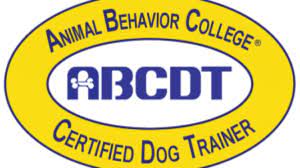 ABCDT certification training includes both real world training with a mentor trainer, who uses positive reinforcement dog training methods, as well as an online dog training course. This hybrid real world/home-study course, which includes LIMA (least invasive minimally aversive) compliant training techniques, provides both an academic and functional foundation in dog training.
ABCDT certification training includes both real world training with a mentor trainer, who uses positive reinforcement dog training methods, as well as an online dog training course. This hybrid real world/home-study course, which includes LIMA (least invasive minimally aversive) compliant training techniques, provides both an academic and functional foundation in dog training.
BCBA-D (Board Certified Behavior Analyst-Doctoral)
BCBA-D is a graduate-level certification in behavior analysis. Professionals certified at the BCBA level are independent practitioners who provide behavior-analytic services. BCBAs may supervise the work of other professionals who implement behavior-analytic interventions.
ACVB (American College of Veterinary Behaviorists)
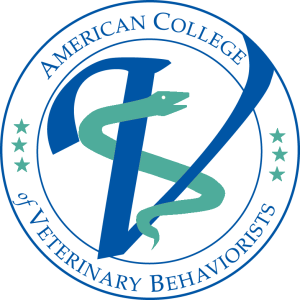 Members of ACVB are veterinarians trained to assess the relationship between an animal’s health and behavior. They provide clinical treatment of behavior concerns in all animal species and have extensive knowledge of psychotropic medications, their uses, potential side effects and interactions with other medications, and are licensed to prescribe them when indicated.
Members of ACVB are veterinarians trained to assess the relationship between an animal’s health and behavior. They provide clinical treatment of behavior concerns in all animal species and have extensive knowledge of psychotropic medications, their uses, potential side effects and interactions with other medications, and are licensed to prescribe them when indicated.
Certified Fear Free
![]() Fear Free certification programs provide online education to veterinary professionals, pet professionals, animal welfare communities, and pet owners. Trainers who complete the Fear Free Animal Trainer Certification Program learn skills to manage and handle dogs and cats alongside veterinary teams so that pets can be given the care they need without apprehension during exams, procedures, and other care.
Fear Free certification programs provide online education to veterinary professionals, pet professionals, animal welfare communities, and pet owners. Trainers who complete the Fear Free Animal Trainer Certification Program learn skills to manage and handle dogs and cats alongside veterinary teams so that pets can be given the care they need without apprehension during exams, procedures, and other care.
These techniques can also be used at home and address behaviors that prevent pet owners from administering home care.
PPG (Pet Professional Guild)
 Members of the Pet Professional Guild (PPG) are committed to providing pet care using force-free methods that support a pet’s physical, mental, environmental, and nutritional well-being, while adhering to holistic approaches for the care and training of family pets.
Members of the Pet Professional Guild (PPG) are committed to providing pet care using force-free methods that support a pet’s physical, mental, environmental, and nutritional well-being, while adhering to holistic approaches for the care and training of family pets.
CSAT (Certified Separation Anxiety Trainer)
 CSATs complete a rigorous three-month program solely focused on separation anxiety and are important partners in providing immediate care while awaiting appointments with veterinary behaviorists, who usually have considerable wait lists. CSATs specialize in diagnosing and implementing strategies to manage separation anxiety that improve the quality of life for pets and their owners.
CSATs complete a rigorous three-month program solely focused on separation anxiety and are important partners in providing immediate care while awaiting appointments with veterinary behaviorists, who usually have considerable wait lists. CSATs specialize in diagnosing and implementing strategies to manage separation anxiety that improve the quality of life for pets and their owners.


